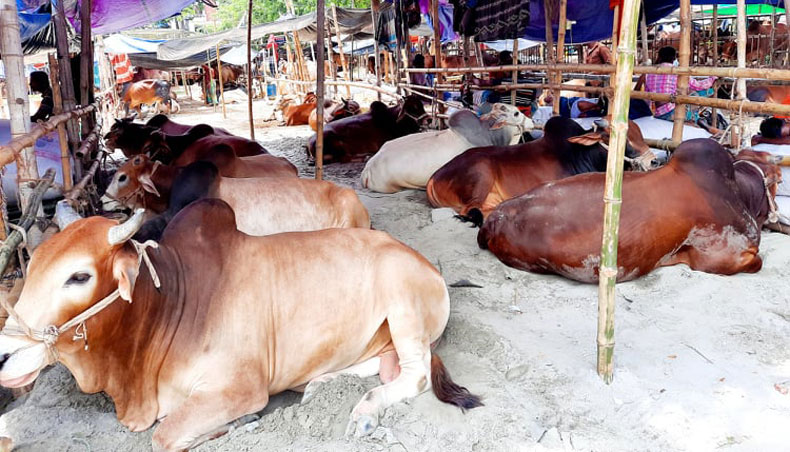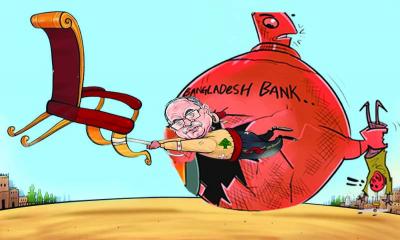Sacrificial animals to meet the demand of Eid-ul-Azha this year is being fulfilled by domestically produced livestock. Local animals have consistently met the demand in recent years in BD; there is no necessity to import animals from abroad. Moreover, the illegal entry of cows through the borders has ceased, leading to farmers in the country receiving favorable prices and experiencing greater ease.
The Ministry of Fisheries and Livestock, research institutes, and researchers in the country are calling this a success of the government. With the increase in farms, employment opportunities are being created in the country. Moreover, the general public is benefiting from being able to consume meat of better quality from domestic animals compared to foreign animals.
Researchers said that, a huge number of Indian cows used to be brought into the country, especially before Eid-ul-Azha, the occasion of sacrificing animals. A large portion of these cows would come through illegal border crossings. Although cows did come from Myanmar, the number was not very high. After the Awami League came to power for the second term, especially from 2016, the government took effective measures to stop the illegal entry of cows through the borders. At that time, the BJP government in India also tightened border controls to stop cow smuggling. After 2017, the influx of cows almost stopped completely. The 'Khatal' (cow markets) near the borders are now completely closed.
With the stoppage of cow imports from other countries, the price of cows in the domestic market also increased. As a result, farmers in the country started showing more interest in rearing cows. According to the Bangladesh Dairy Farmers Association (BDFA), there are more than 10 lakh small and large fattening and dairy farms in the country. However, the BDFA states that 15-20 percent of the farms closed down due to the COVID-19 situation and rising food prices. The Department of Livestock Services, however, reports an even higher number of farms.
From 2018, cow production was on par with the demand during Eid-ul-Azha. Even during the COVID-19 period in 2020, the demand for sacrificial animals was lower compared to production. According to the Ministry of Livestock, there were 1 crore 19 lakh 16 thousand 765 animals available for sacrifice during Eid-ul-Azha in 2021. And 90 lakh 93 thousand 242 animals were sold. 28 lakh 23 thousand 523 animals remained unsold.
In 2022, the demand for sacrificial animals was 97 lakh 75 thousand. In contrast, the supply of animals was 1 crore 21 lakh 24 thousand 389. There were almost 23 lakh more animals than the demand.
In 2023, for the holy Eid-ul-Azha, the demand for sacrificial animals in the country was 1 crore 3 lakh 94 thousand 739. For sacrifice, there were 1 crore 25 lakh 36 thousand 333 animals in the country. According to this estimate, there were 21 lakh 41 thousand 594 animals more than the demand.
For the upcoming sacrifice this year, 1 crore 30 lakh animals are ready, as informed by Abdur Rahman, the Minister of Fisheries and Livestock, at a press conference at the ministry on Monday. The minister said that like the past few years, the supply will be higher than the demand this time as well. There will be no need to import animals from abroad. “Due to the government's success in increasing farm numbers in the country, there is no longer a need to import animals for sacrifice,” he added.
An organization named Somaj-O-Jati Gathan (SOJAG) located in Dhamrai, near Dhaka, purchases cows after Eid-ul-Azha every year under a micro-credit program and distributes them among farmers. This year too, the organization has provided more than 5 thousand cows to farmers.
Abdul Matin, the director of SOJAG, said that as the entry of cows through the borders has stopped, farmers are getting relatively higher prices. Although there are allegations that middlemen are making excessive profits due to the increase in feed prices and an uncontrolled meat market, preventing farmers from getting fair prices. However, it must be acknowledged that farmers are benefiting from the absence of foreign cows.
He said, “Until 2016, the domestic farmers were in a poor condition due to the pressure of Indian cows. Now that situation has improved, and large portions of the unemployed people in the country are setting up cow farms.”
Professor Dr KBM Saiful Islam, Dean of the Department of Animal Science and Veterinary Medicine and Chairman of the Department of Medicine and Public Health at Sher-e-Bangla Agricultural University, said that, “The stoppage of cow entry through the borders is undoubtedly a success for the government. Because at one time, farmers were losing interest as they were incurring losses due to low prices caused by the influx of foreign cows. But now, the situation is the opposite. The government could not even collect taxes properly in the case of cow imports through the borders. Moreover, most of the Indian cows were diseased. The meat of domestic cows is comparatively healthier.”
Regarding this issue, Dr Nasrin Sultana, Director (Research) of the Bangladesh Livestock Research Institute (BLRI), said, “The government's decision to stop the illegal entry of cows through the borders and cancel the decision to import cows was a very important one. The government has achieved success in this regard. As with higher prices, many people are now setting up farms. Employment opportunities are being created.”
ZH






